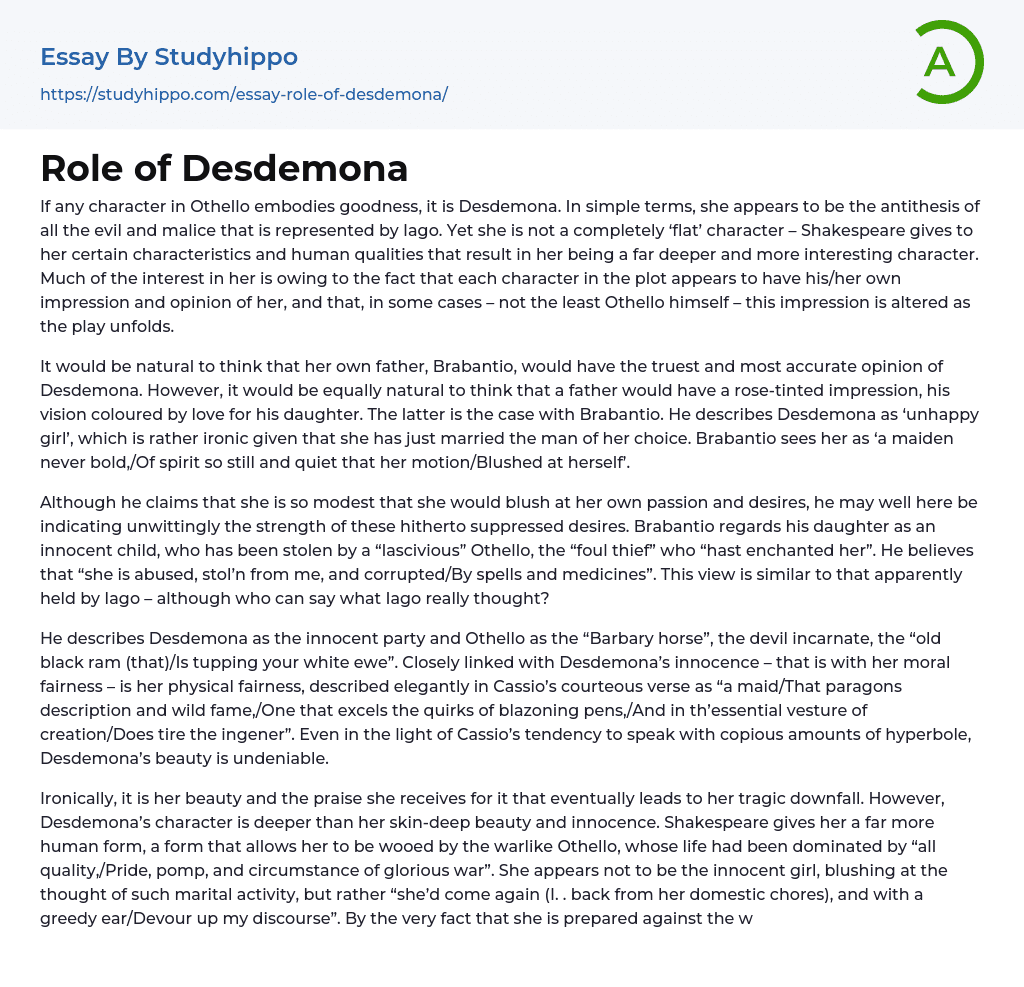Desdemona is portrayed in Othello as a representation of goodness, contrasting with Iago's maliciousness and vindictiveness. Yet, Shakespeare has endowed her with distinct qualities and human traits that render her a multifaceted and captivating character. What enhances her allure is the fact that every character in the play holds their own perspective and judgement of her, which may evolve throughout the story, particularly when it involves Othello.
Despite Brabantio being Desdemona's father, his perspective on her may be biased because of his love for her. This bias is evident in how he portrays Desdemona as an "unhappy girl," which is ironic considering she has recently married the man she loves. Brabantio sees her as a timid and modest maiden who even becomes embarrassed by her own actions.
Despite his claim
...that she is very modest and would be ashamed of her passion and desires, he may unintentionally be implying the power of these previously repressed desires. Brabantio perceives his daughter as an innocent and pure child who has been taken by a lustful Othello, the detestable thief who has enchanted her. He believes that she has been abused, stolen from him, and tainted through the manipulation of magic spells and potions. This perspective aligns with Iago's apparent belief, although it remains uncertain what Iago genuinely believed.
The text depicts Desdemona as a pure and innocent character, while Othello is compared to a devil and a black ram. Desdemona's innocence is strongly linked to her ethical fairness and physical attractiveness. Cassio praises her as being beyond description and fame, surpassing even the most skilled writers. Despite Cassio's tendency to exaggerate, i
is undeniable that Desdemona possesses remarkable beauty.
Desdemona's tragic downfall is ultimately caused by her beauty and the admiration she receives for it, which is ironic. However, Shakespeare presents Desdemona as a complex character who goes beyond her outward appearance. Despite the differences in their lives, Othello manages to woo her, showing that she is not simply an innocent girl who blushes at the thought of marriage. Even after finishing her domestic chores, Desdemona eagerly listens to Othello's stories. By eloping with a soldier against her father's wishes, especially a black soldier, she proves that she is not just the "white ewe" Brabantio sees her as. In fact, Brabantio acknowledges Desdemona's independence when he warns Othello about her potential for deception.
The young lady is portrayed as independent and proactive, especially when she confidently presents herself before the Duke and other senators in the council chamber. She expresses her thoughts directly yet gracefully, showing a strong sense of responsibility and respect towards both men in her life. She views her "noble father" as someone to obey and learn from for the rest of her life. Furthermore, she understands the significance of prioritizing her husband over her father by imitating her late mother's actions.
Hence, Desdemona’s ability to inspire faith is demonstrated when she declares, “Due to the Moor my lord”, implying that she openly professes her faith. Although Othello ironically expresses complete trust in her faithfulness with the words, “My life upon her faith”, Iago consistently undermines Desdemona’s reputation with vile accusations. The manipulative and malicious Iago tries to convince Roderigo that Desdemona is merely a prostitute who will soon abandon Othello
and be accessible to him.
Iago manipulates Othello by convincing him that Desdemona's love for him will not last and she will eventually desire a younger lover. He convinces Othello that Desdemona is promiscuous, evil, and deceitful. This manipulation ultimately leads Othello to believe this false impression and kill his wife.
However, Desdemona's deathbed demeanor, actions, and words reveal her true character. It is clear that she is confused and does not comprehend why Othello has turned against her: "I understand the fury in your words, but not the words." This demonstrates that she is still the innocent ewe, unprepared for the life of a soldier's wife. Furthermore, Desdemona is blameless and innocent, as her dying words testify, "A guiltless death I die."
Shakespeare intended Desdemona's character to represent goodness, which is evident in her final words. When Emilia asks who killed her, Desdemona replies, "Nobody, I myself. Farewell. /Commend me to my kind lord. O, farewell!" These two lines showcase Desdemona's innocence, naivete, reluctance to blame others, and acceptance of her own imagined faults leading to her death.
- Othello Jealousy essays
- 1984 essays
- A Farewell to Arms essays
- A Good Man Is Hard to Find essays
- A Hanging essays
- A Lesson Before Dying essays
- A Long Way Gone essays
- A Rose For Emily essays
- A Separate Peace essays
- A Tale Of Two Cities essays
- A Very Old Man With Enormous Wings essays
- Adventures Of Huckleberry Finn essays
- Alice in Wonderland essays
- All Quiet on The Western Front essays
- Allegory of the Cave essays
- An occurrence at owl creek bridge essays
- Animal Farm essays
- Anthem essays
- Antigone essays
- Arthur Conan Doyle essays
- As I Lay Dying essays
- Atticus Finch essays
- Barn Burning essays
- Battle Royal essays
- Beauty and The Beast essays
- Beloved essays
- Boo Radley essays
- Brave New World essays
- Candide essays
- Castle essays
- Characters In Hamlet essays
- Characters In Romeo And Juliet essays
- Christmas carol essays
- Chronicle of a Death Foretold essays
- Cinderella essays
- Crime and Punishment essays
- Daisy Miller essays
- Death of a Salesman American Dream essays
- Desdemona essays
- Diary Of A Wimpy Kid essays
- Dracula essays
- Dubliners essays
- Emma essays
- Ender'S Game essays
- Ethan Frome essays
- Eveline essays
- Fahrenheit 451 essays
- First-Person Narrative essays
- Fish Cheeks essays
- Frankenstein essays




